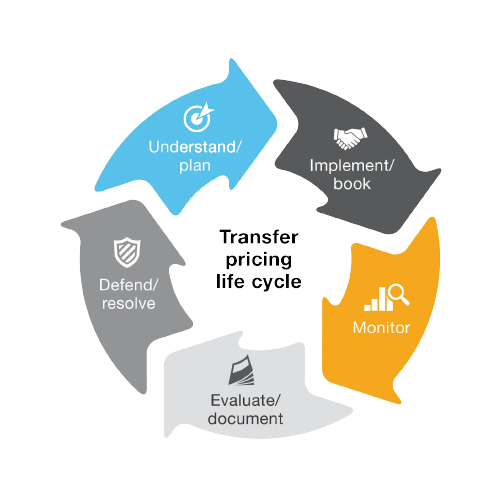Transfer Pricing
Transfer pricing is an accounting practice that represents the price that one division in a company charges another division for goods and services provided.
Transfer pricing allows for the establishment of prices for the goods and services exchanged between subsidiaries, affiliates, or commonly controlled companies that are part of the same larger enterprise. Transfer pricing can lead to tax savings for corporations, though tax authorities may contest their claims.
Benefits of Transfer Pricing:-
- Lowering duty costs by shipping goods into high-tariff countries at minimal transfer prices so that duty base and duty are low.
- Reducing income taxes in high-tax countries by overpricing goods transferred to units in such countries; profits are eliminated and shifted to low-tax countries.
- Facilitating dividend repatriation when dividend repatriation is curtailed by government policy by inflating prices of goods transferred.
Required Documents:-
- Local File:- This needs to be documented with the company itself.
- Master File:- Need to be filed with the IT department.
- Country by Country Report:- Need to be filed with IT department.

FAQ of Transfer Pricing
Auditing Services When two or more associated companies enter into a mutual contract during an international transaction in order to apportion a particular cost incurred in relation with a benefit, service or facility offered by any one or all of the companies, such a cost shall be calculated considering the arm’s length price of the particular benefit, service, or facility, as applicable.
According to sections 92, 92A, 92B, 92C, 92D, 92E and 92F, a company can be termed as an associated enterprise with respect to the other under the following circumstances. –
If the respective company is involved directly or indirectly or with the help of one or more intermediaries in the management, control, or the capital of the other company. –
If any person/persons of the respective company who is/are involved directly or indirectly or with the help of one or more intermediaries in the management, control, or the capital of one company is/are involved directly or indirectly or with the help of one or more intermediaries in the management, control, or the capital of the other company.
An international Transaction is defined as any transaction between two or more associated companies situated in different countries in terms of a property that is tangible or intangible, a service offered by the company, or any form of lending of money, etc. It is compulsory that at least one of the participants involved in the transaction is a non-resident of India. However, a transaction that has been carried out by two non-resident Indians, where one of them possesses a permanent setup in India and whose income is taxable from India, such a type of transaction is also considered as ‘International Transaction.’
Any person who has involved in an international transaction in the previous year shall submit the report in Form 3CEB through a Chartered Accountant, duly verified by him, on or before the date prescribed by the authority, furnishing all the required details.
